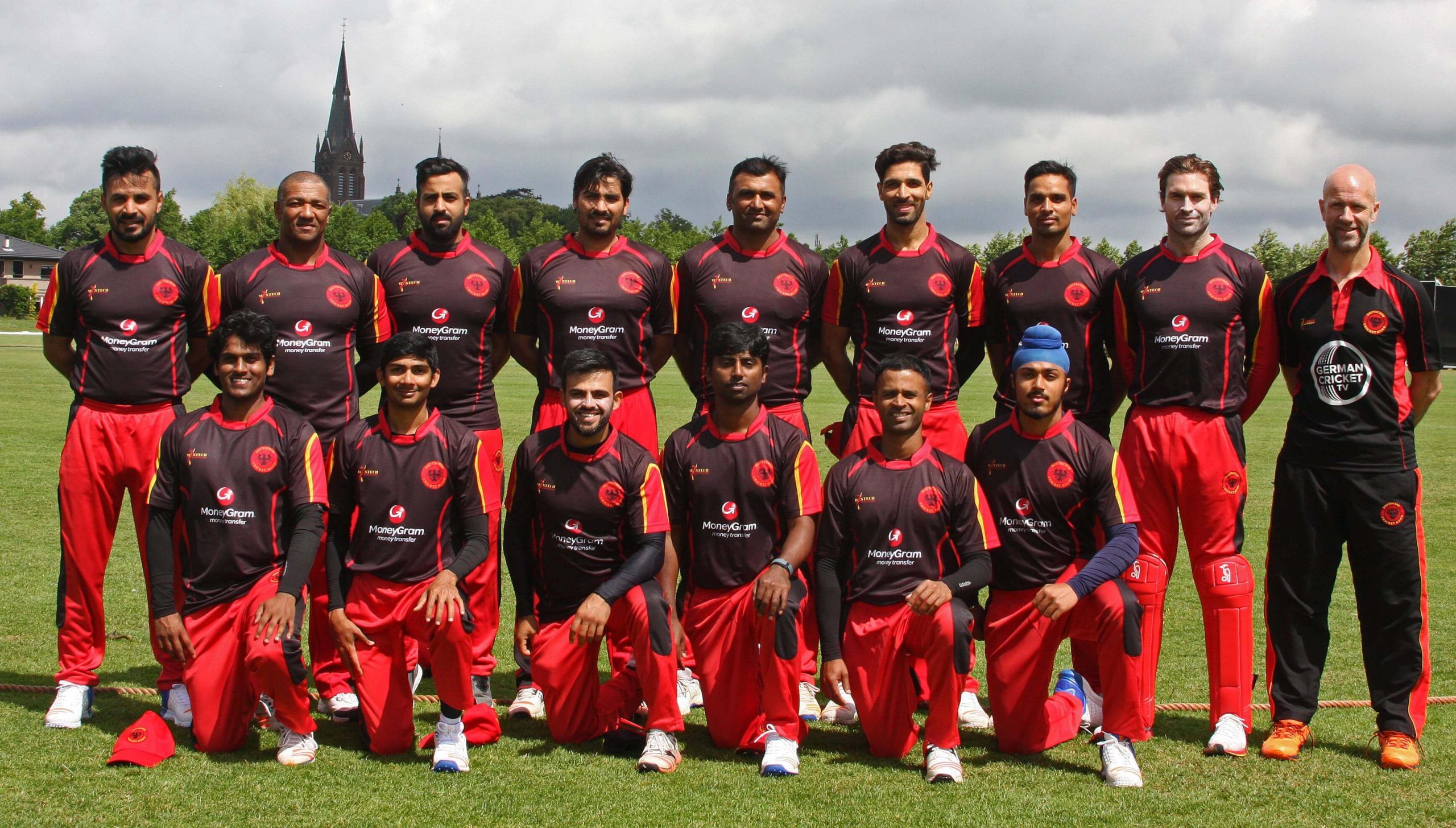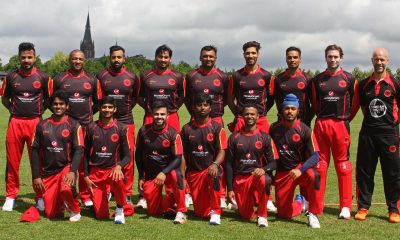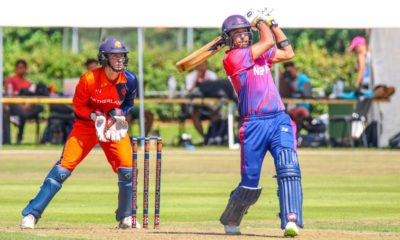
Thousands of cricket-mad Afghanistan refugees have contributed to hundreds of new clubs popping up in Germany, and the national team is now on the rise.
Imagine it’s 2028, and Germany faces India in the first one-day cricket international between nations at Berlin ‘s iconic Olympic Stadium.
Such a historic David vs. Goliath clash remains a distant pipe-dream, but it could be a glimpse of the future with cricket booming in football-mad Germany.
Though still a minority sport, the number of players here has doubled over the past couple of years, and the German national team, composed of expats eligible for citizenship, is on the rise.
On Monday in Frankfurt, Germany hosted the world’s oldest club, the prestigious Marylebone Cricket Club, an invitational team composed of players with first-class international experience.
The MCC visit helps Germany prepare for the Europe Division One tournament in the Netherlands next month against fellow minnows such as Belgium, France, Norway and Sweden.
After winning two tournament in Sweden last year’s division, Germany is hoping for another promotion in Holland in September to join World League Division Five in South Africa-the first ladder rung to World Cup.
“To be honest I wasn’t even sure Germany hosted much cricket, but the standard looks quite good and we’re hearing goods things about the future numbers,” former Yorkshire batsman Jim Love, who managed the MCC team, told AFP.
Less than two weeks ago we were in @DSCricketSpain with our men’s national team. It seems like a lifetime ago. Good times will return. 🇩🇪🏏 pic.twitter.com/iRe7bt31ZL
— Cricket Germany 🏏 (@Cricket_Germany) March 18, 2020
Afghan influence
The refugee crisis of 2015 entailed thousands of new arrivals from cricket-mad Afghanistan.
New clubs are popping up worldwide, and in 2016 the German Cricket Federation (DCB) funded over 450 refugee initiatives.
Having scored his maiden international century against New Zealand for Ireland a fortnight ago, Niall O’Brien hit 96 in Monday’s 50-over match, when the MCC beat Germany by 76.
“I’m from a smaller cricketing nation with Ireland and have been involved since it was a minor sport back home, so I know what the Germans are facing,” said Ireland’s wicketkeeper.
“It is going to be a long journey.
“The numbers are growing – which is a key thing – and standards are improving.
“It would be great, in five to ten years, to see them doing what Ireland or Afghanistan are doing now.”
The challenge for Englishman Brian Mantle, the CEO of the German Cricket Federation (DCB), is to meet the increasing demand with limited resources.
The MCC donated equipment, a drop in the ocean compared to what the DCB needs, but there are hopes that if the IOC votes in September to make cricket an Olympic sport, the German Government will provide funding.
Nevertheless, the prospect of a German organisation, mixed with raw Afghan talent, excites Mantle.
#Fridayflow
— European Cricket (@EuropeanCricket) March 27, 2020
🏏 Taking you back in time to some of the biggest hitting in German Cricket 🇩🇪6️⃣🏏https://t.co/XcSIwRw4nL#EuropeanCricketFamily #EuropeanCricket #ECL19 #Kaboom #GermanCricketTV@Dream11 @the_fancode @Cricket_Germany pic.twitter.com/NjWODcCVeW
“We have a big, big future. It’s too early to start thinking about World Cups and test cricket, but we’re definitely growing,” said Mantle.
“A lot of refugees need to be here for a certain amount of time before they qualify for the national team.
“The Afghans tend to be a lot faster, more dynamic, but they maybe need to learn a little more discipline and the tactics of cricket.
“It makes it a good mix – we all learn from each other.
“In four or five years we will have a very good national team, which will hopefully be a mixture of home-grown talent and those who have come here.”
And what about an international one-day future against England or Australia’s likes?
“We aspire to play against England but we have other aspirations, like competing against nations such as the Netherlands and Ireland,” Mantle said.
“If we did that, we could think of other stuff but it would be a fantasy.”
Rishi Pillai, now captain of the national team, had no idea that cricket was played in Germany when he arrived from Pune , India, in 2004 in Aachen,.
“I started playing in the Netherlands,” he admitted.
“I didn’t play here until 2008, and never dreamed that I would have the opportunity to captain Germany.
“As for the interest, the number of clubs and players, things have changed massively.
“The influx of refugees has had a significant impact in the last two years.
“They are bringing a different culture, most of them have no cricket education, but here it’s becoming a very strong mix.”
Daniel Weston, Germany’s wicket-keeper, is from Perth , Australia.
Last year, after noticing cricket was taken more seriously, he broke into national team.
“I was in the Australia Under-19 squad and played second XI for Western Australia. I loved my cricket but didn’t feel that I was good enough to make the top level, so I went on a tour,” the 34-year-old said.
German Cricket TV
“I arrived in Munich, ended up staying, made friends and played like a hobby.
“Then there was a lot more discipline in the cricket scene with fitness training , testing and a new coach-that ‘s when I put my hand up.”
Weston founded German Cricket TV last year which posts short videos on social media and has more than 750,000 Facebook followers.
“I’m in technology and after we posted a short Facebook video of the squad, we got 10,000 followers. There it went, “he explained.
Weston says Germany has an immense source of untapped cricket talent.
“It is as if German football coaches were going to Brazil, picking their favorite street footballers and taking them home,” he said.
“This is a great opportunity, because we have all of the Afghans here now.
“They will learn German, integrate and have German children, who will be lovers of cricket.
“I would love to see that cricketers are being nurtured to give them a path to a World Cup, because they are incredibly talented.
“But it’s not from the German government-they ‘re not clueless about that.
“Today, Germany ‘s best cricketers are not here, since they are still unknown.
“We ‘re only discovering them when they get to tournaments for integration.”

Must See
-


Other Sports
/ 4 years agoLindsey Vonn: Hottest alpine ski racer with Four World Cup championships
Lindsey Vonn, born Lindsey Kildow, (born 18 October 1984, St. Paul, Minnesota, U.S.A.), united...
By Sportspark -


Other Sports
/ 4 years agoToday’s Pic Darya Klishina: Super Hot Russian Long Jumper
Darya Klishina was born on January 15, 1991 and a very famous Russian long...
By Sportspark -


WWE
/ 4 years agoNikki Bella: Longest running Divas Champion in WWE history
Born on November 21, 1983, Nikki Bella is a very famous professional wrestler, businesswoman...
By Sportspark -


Other Sports
/ 4 years agoAmanda Beard: Is Seven Time Olympic Medalist Hottest Swimmer Ever ?
Born in 1981 as Amanda Ray Beard, on 29 October, Amanda Beard, who is...
By Sportspark -


Other Sports
/ 4 years agoAnna Prugova : Hottest Ice Hockey player Ever ?
Anna Prugova, born as Anna Aleksandrovna Prugova in the year 1993 on 20 November,...
By Sportspark -


Other Sports
/ 4 years agoRowan Cheshire: Hottest English Skier Ever
Rowan Cheshire was born on 1 September 1995 and is a British freestyle skier...
By Sportspark -


Other Sports
/ 4 years agoPaige Spiranac: The world’s HOTTEST golfer
Paige Spiranac was born on March 26, 1993, and she is a very popular...
By Sportspark -


Cricket
/ 4 years agoGermany Cricket : Rise Of The fastest growing nation in world cricket
Thousands of cricket-mad Afghanistan refugees have contributed to hundreds of new clubs popping up...
By Sportspark











You must be logged in to post a comment Login